#unfeigned writer
Explore tagged Tumblr posts
Text

"At the heart of all great art is an essential melancholy."
Federico García Lorca
#poetry#diary#poets corner#life#poet#vintage#nature#poetic#dark academia#love#unfeigned writer#federico garcía lorca#my poetry#poets on tumblr#writers and poets#melanchonic
31 notes
·
View notes
Text
So, I don't usually like to write analysis of my own writing*, but my most recent chapter - Part 6, Chapter 10 - includes a thing that I've kind of been thinking about. The following includes spoilers! (*this is a very funny joke that my longtime commenters will laugh at, seeing as how about half of my responses include an HTML details tag with an analysis of my own writing)
Tourist Traps!Ford Pines + Religion
Spoilers below the cut.
Something that attuned readers may notice is that my version of Ford is abnormally... not angry. Like, he gets real mad and all, but after we cross his character turning point in part 4 or so, his main emotions are fear and sadness. This is in distinct contrast not just to Stanley, but also the TV show version of Ford.
Part of this is probably just my limitation as a writer -- I'm more comfortable writing fear than anger -- and part of this is because Will is the Anger Management Character™, but most of this is because of how I'm portraying Ford's emotional disorder. Basically, the entire story arc is about him coming to terms with his PTSD. The way I write him, anger was a trained response and not natural to his personality. This isn't out of nowhere. In supplemental materials that show the Stan twins as children or teenagers, Stanley is the hothead, and Ford is a lot more likely to withdraw in the moment and stew with a long-term grudge.
Tourist Traps Ford was a tearful, sensitive kid, and this was badly discouraged. The Pines family saw anger as an acceptable "manly" emotion and crying as unacceptable and "childish," so he had to learn to suppress most of his emotions aside from anger. When he becomes more mentally healthy, he unlearns this trained behavior: he becomes less angry and more sad.
That said.
As my very astute readers may have noticed, we do see genuine, unfeigned anger in Chapter 10 whenever we touch on one specific topic: religion.
Ford has complex/childhood PTSD. I don't think anyone is surprised to hear me say it. Moreover, he didn't realize that he had childhood PTSD until recently, and even then, he mostly contextualized it as the result of bullying instead of as persistent emotional abuse in the household.
The thing is, Ford was consistently treated as the "sensitive" kid -- and he was! He was sensitive! He did get upset over relatively minor infractions, he had trouble handling his emotions, he responded to conflict by becoming overwhelmed instead of responding directly to the conflict! That in and of itself isn't a problem. Those emotionsand behaviors are pretty normal and common, and if you're a kid who leans a bit sensitive, then usually it's helpful to have a trusted adult who will affirm your emotions, teach you to manage them, and help you understand which stimuli deserve your current emotional reaction and which ones don't. Ford didn't have that. Ford was consistently told that his emotions were unreasonable, to the point where he never formed a good mental framework for when it is appropriate to get upset.
This is where his atheism comes in.
When you always feel like your identity is under threat and are constantly trying to suppress the vague discomfort that brings, you can sometimes latch on to one thing that's a "reasonable" thing to be angry about. This is the one thing that, no matter how much people try to imply that your emotions are disproportionate, you know it's not just you.* (*Mind you, it doesn't actually matter if you're correct. You only have to know that other people could back you up. In fact, I think this is one place that bigotry can rear its ugly head: I was once gaming with a guy who people wouldn't listen to when he tried to say that their singing Disney songs was bothering him, so instead he implied that it was just a cringe thing women did. Sexism was his fallback because he didn't think his feelings had sway. Bigotry gives people a framework to discourage behavior. This is one of many reasons why people do heinous shit.)
For Ford, atheism is his "one thing." Ford is an atheist, and he knows other atheists who are intelligent and well-educated people, and he knows that religious people tend to act unfairly to atheists. He sees religion as an anti-academic superstition, which means that he doesn't feel the need to question that he's right and they're wrong. He feels confident that his atheism is a well-thought-out and defensible position. So, if other people want to steamroll over his thoughts and feelings in general, then he can't fault them; but if they want to attack his atheism, then he has it on very good authority that they're the ones in the wrong.
Ford can't fault his family for calling him weird, or saying his career is stupid, or saying he has no social skills. If they ask him why he doesn't have a wife he risks serious repurcussions for honesty. If he's quiet all dinner or won't eat the food or can't make eye contact, well, he's the one who's being rude. Yes, it makes him upset when Shermie treats him this way, but that doesn't mean Shermie is wrong. It just means that Ford is "sensitive."
But he's allowed to be an atheist, and if Shermie is a dick about it, he's allowed to be angry.
9 notes
·
View notes
Text
"But a backward look into recent history shows that, although their social context has greatly changed over the last century, such attitudes are not new. A reader of Toronto’s Christian Inquirer in 1926, for instance, would have encountered the following:
This touchy Jehovah whom the deluded superstitionists claim to be the Creator of the whole universe, makes one feel utter contempt for the preachers and unfeigned pity for the mental state of those who can retain a serious countenance as they peruse the stories of His peculiar whims, freaks and fancies, and His frenzied megalomaniac boastings.
This provocation would not have seemed unusual coming from a twenty-first-century New Atheist writer such as Richard Dawkins or Christopher Hitchens. But in 1927, rather than being offered a publishing deal as they were, the author of these words was convicted of the crime of blasphemous libel. He was sentenced to sixty days on a jail farm, and an order was issued for his deportation from Canada.
Even in the 1920s, however, such rhetoric was not universally unpopular in Canada. In 1929 a debate between a fundamentalist and an atheist living in Winnipeg drew an impassioned audience that numbered over three thousand. A reporter compared the mood at the event to that of a hockey game, and at the end the atheist was overwhelmingly voted the winner. In Montreal, meanwhile, a radical group offered free weekly lectures, many of them vehemently anti-religious. One attendee recalled:
When you went up the stairs to the hall, you had to pass a huge picture of Jesus Christ with a knife in his hand dripping from the blood of the worker he was stabbing. And thousands of French-Canadian workers tipped their hats to that picture.
Despite stiff official opposition, hostility to Christianity was evident in a number of different spaces in the interwar period. It was played out in lecture halls, newspaper letter columns, the streets and parks of major cities, books written by disillusioned veterans, and elsewhere."
- Elliot Hanowski, Towards A Godless Dominion: Unbelief in Interwar Canada. Montreal & Kingston: McGill-Queen’s University Press, 2024. p. 4-5.
[Great start to a book I am really enjoying so far.]
#christianity in canada#history of irreligion#atheism#history of atheism#working class history#montreal#toronto#winnipeg#history of religion#academic quote#canadian history#working class atheism#towards a godless dominion#great depression in canada#interwar period
5 notes
·
View notes
Note
i am now officially the amateurish rapscallion of a writer in your inbox. I stand upon that stage now, the lights fierce as though they might scorch a hole in the very heavens, and the din--Lord, the din. Applause that shakes me to my core, a damn storm I never bargained for. The crowd--a blur of faces, of clapping hands, of smiles too brittle, hungering for approval, aching for something true, something unfeigned. But there is nothing but this . . . pretense. A tiara is pressed into my blonde ringlets, and its frigid metal eats into my dry scalp. They smile at me, every one of them, as though they have crowned the right girl, the perfect one, the real Miss World. A bouquet is thrust into my hands--vivid, radiant, bloated. The roses are too red, too perfect. Too damn counterfeit. I smile, for that is what they crave, is it not? I kiss my friends, and they kiss me back, cheeks melded together, their lips leaving bits of what might be affection--but I have long since crossed the door where feeling resides. They do not know who I am. Not one of them. Not a single person understands what is behind these eyes. No one sees the fractured, the hollowed-out void where my heart once beat. I kiss them all, one by one, and wear this image like it is a birthright, pretending I am not withering from the inside out. Pretending I am not drowning in the cage they have built for me--the Miss World they crave, the one they have carved, the one I have been forced into. I feel their hands on my back, their arms around my waist, and wonder how many of them are lying to themselves as well. How many of them are just as adrift as I am, playing this part, pretending that this is what they wanted, pretending that this moment, this tiara, this bouquet--it holds any sort of meaning at all. I kiss another cheek. Smile, smile, smile. The cameras flash, greedy for every movement, every little second, as if I were some divine thing to be revered. Some beauty to be adored. And for a moment, maybe--just maybe--I almost buy it. I almost convince myself that I am who they want me to be. That this tiara, this bouquet, this entire damn pageantry of praise and clamor might mend the hollowness inside me. Could make me forget that I am shattered, infected, untethered. But then I glimpse my own reflection in the mirrored backdrop, and I see myself once more. Not the girl they want me to be, not the one they think I am, but the girl who can't look you in the eye. The girl who cannot stop lying, even to her own heart. I stand there, the crowd's jubilant cries swelling around me, and for an instant, the clamor dissolves into a tender, humming void. Everything grows still. I feel the bouquet slipping through my fingers, and I wonder if this is all I am. If this is all I will ever be--the girl in the gem-encrusted tiara, the girl in the perfect picture frame, surrounded by admirers who cherish her, oblivious to the reality. I stand there, consumed by the din, consumed by the show, and I cannot help but wonder--perhaps with a bit of bitter amusement--if I will ever know what it is to be real again. I made my bed. Now I have to lie in it. But what if I do not want to? What if I just want to disappear? Would anyone even care? They will cheer. They will clap. They will pretend they love me. But deep now, I know the truth-- they will never know who I am, they will never really see me. So, I smile. I press one last kiss to a stranger's cheek. The cameras flash. The crowd roars. And I lie--just like I always have. And I wonder . . . How long can I keep pretending? — 💋ྀིྀི
this is honest one of the best things i’ve ever read — i showed this to my friend and she agrees with my wholeheartedly. 🤍
2 notes
·
View notes
Text
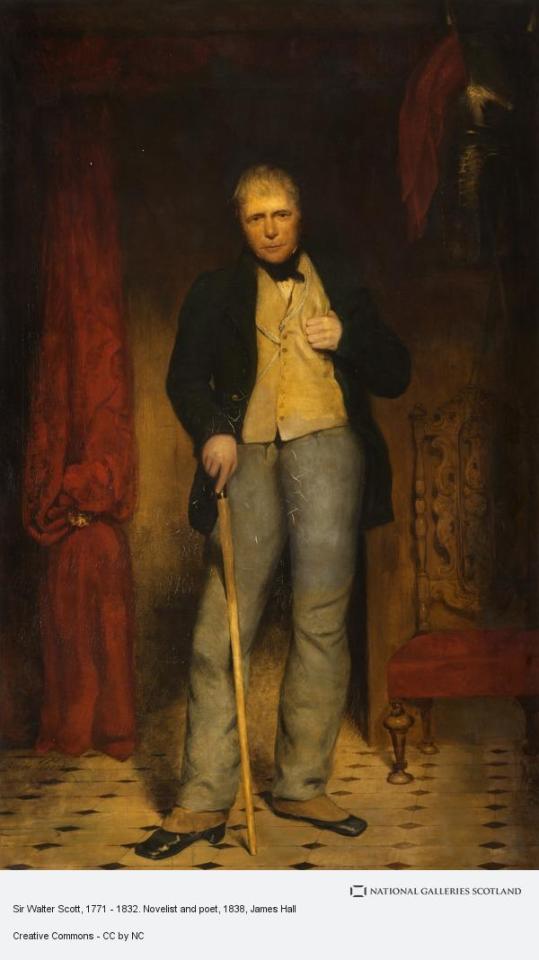
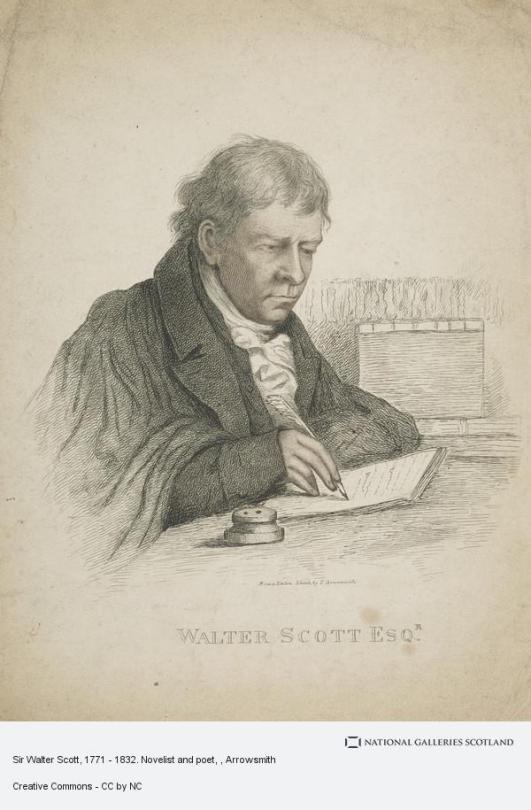
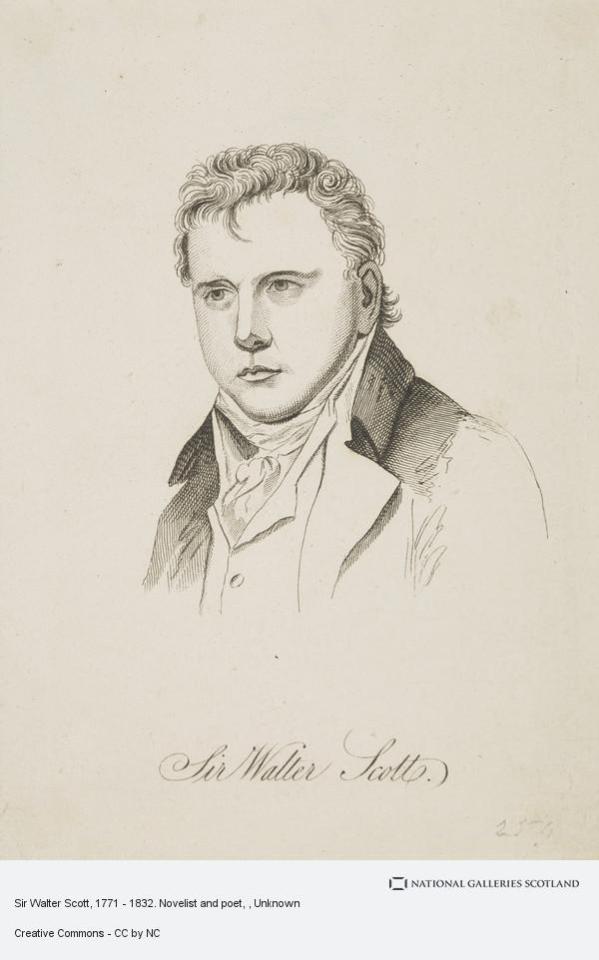
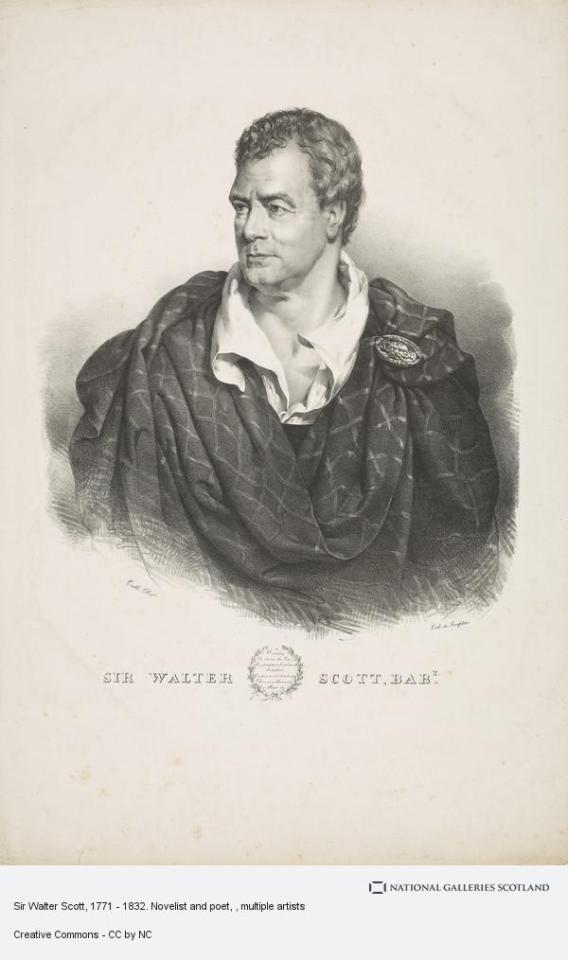
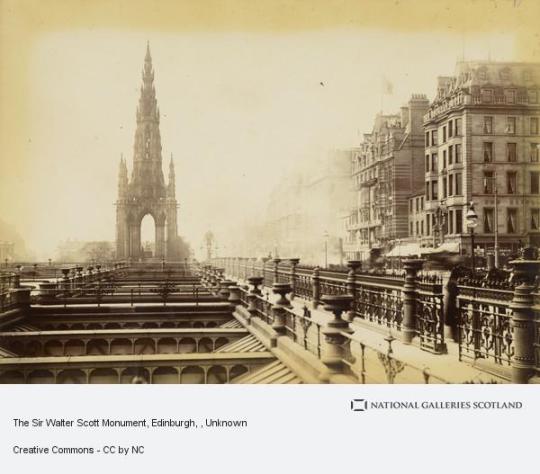
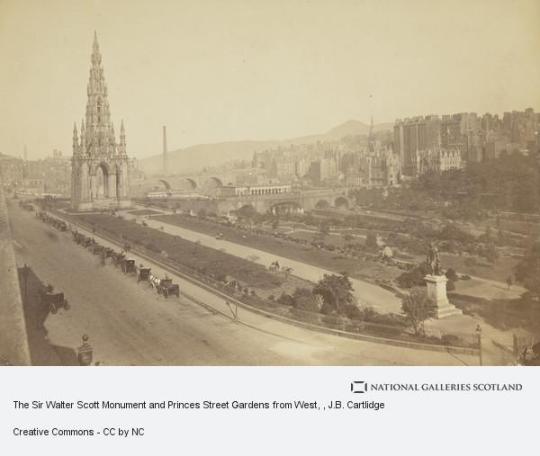
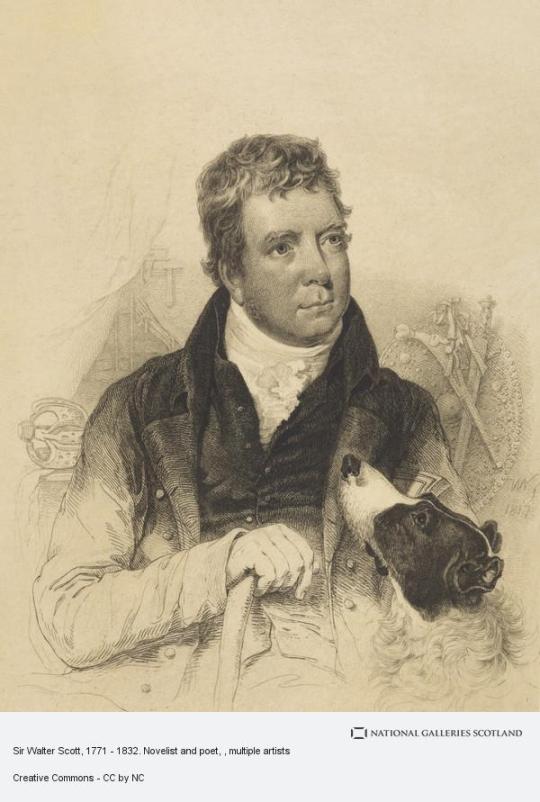
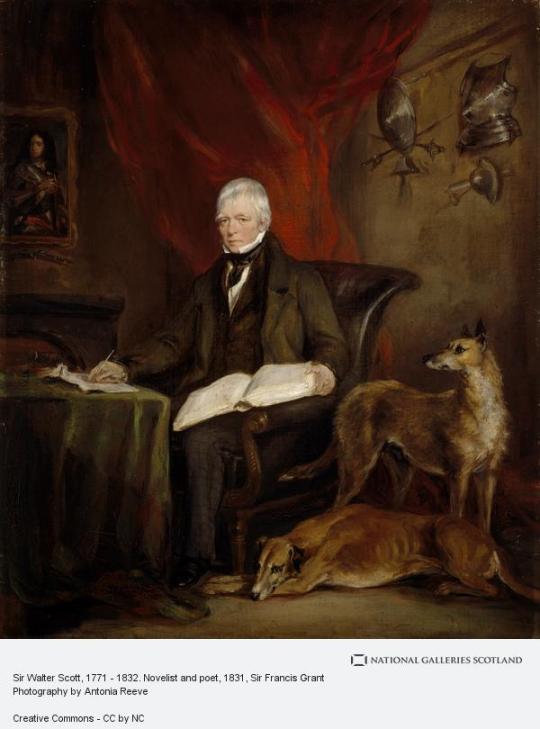
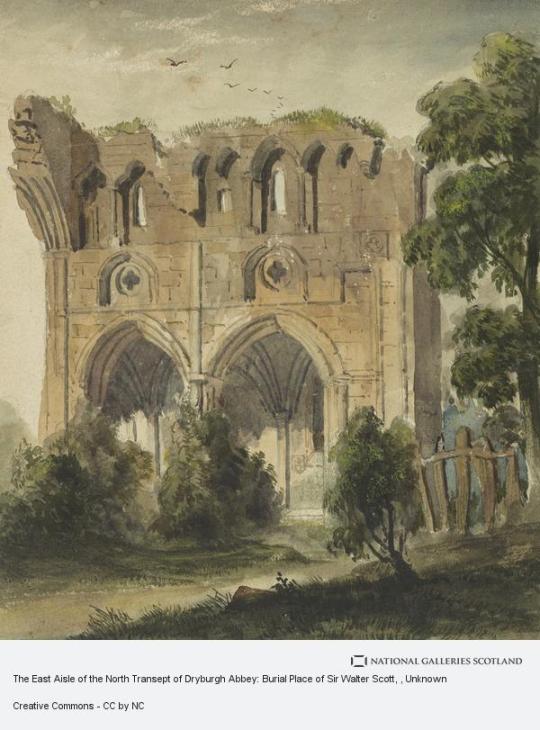
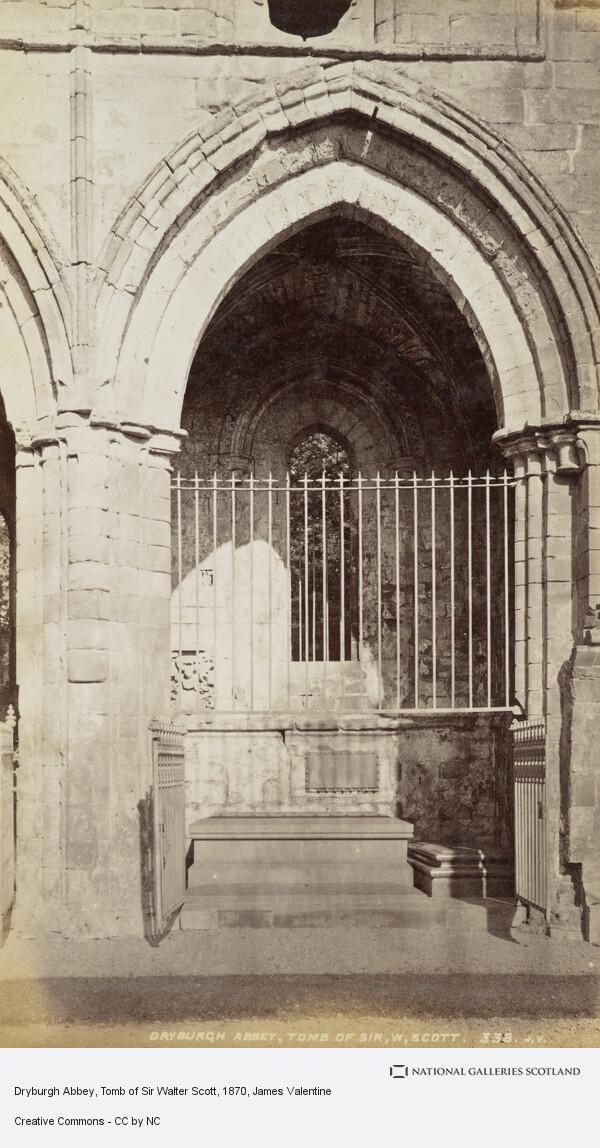
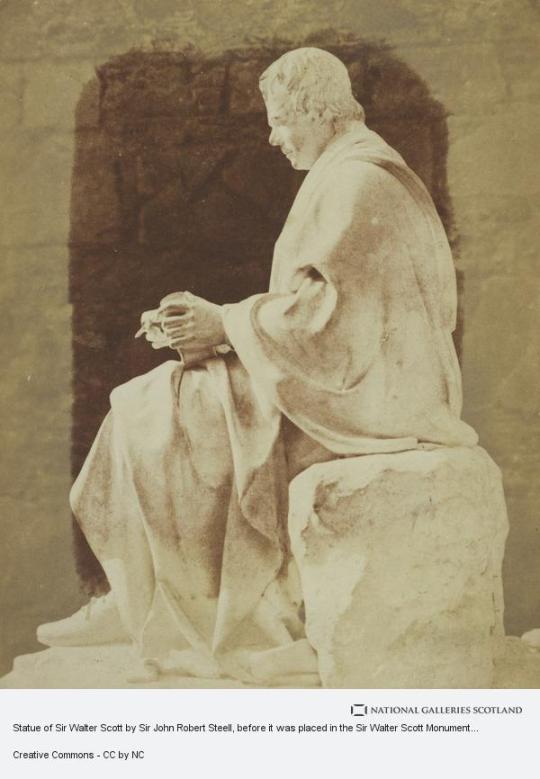
The novelist and poet Sir Walter Scott died aged 61 on September 21s 1832.
Walter Scott was born in Edinburgh in 1771 but was sent to live on his grandfather's farm near Kelso after he contracted poliomyelitis at the age of 18 months. He stayed there until 1777, and it is thought that it during his period of convalescence that he absorbed the historical and literary culture of the Borders, having heard the traditional ballads and legends about the Border heroes and reivers. Scott is best known for his novels such as The Heart of Midlothian, Ivanhoe, Rob Roy, and The Fair Maid of Perth. However, he also published translations, reviewed extensively, and wrote historical tracts. Regarded in his day as one of the greatest writers, Scott's reputation since then has been subject to intense scrutiny and he has been criticised for presenting a mythical, overly romantic image of Scotland.
Below are a few contmporary newspaper accounts of Scott's deathand funeral.
From The Literary Gazette :
At half past one on Friday the 21st, Sir Walter Scott breathed his last, surrounded by all his descen- dants, and apparently almost without a struggle. During some two or three days after his arrival at Abbotsford, he appeared to feel with satisfaction that be was once more at home; was occasionally wheeled, for half an hour, up and down the library, armoury, or garden ; and even once or twice listened with apparent interest to a page of the Old Testament, or a favourite passage in Crabbe or Wordsworth ; but after this be fell rapidly into the same stupor that had hung over bim while he remained in London, and for full six weeks there had occurred hardly an interval of any thing approaching to collectedness. It was well that the curtain dropped when it did on a scene from which hope had all along been excluded.
From The Edinburgh Courant :
Wednesday, the honoured remains of Sir Walter Scott were consigned to the tomb, amid the unfeigned regret of thousands. Never perhaps was the esteem in which this truly great man was held more conspicuously displayed than on this melancholy occasion. We understand that cards had been issued to nearly 300 persons, who almost all attended, it being deemed an honour to be present at the funeral obsequies of so distinguished a character. One o’clock was the hour fixed on for the time of meeting, and for about an hour afterwards carriages of different sorts, and gentlemen on horseback, continued to arrive from Edinburgh, Peebles, Selkirk, Galashiels, Melrose, Jedburgh, and other parts of the surrounding country. The company having partaken of refreshments, adjourned to the library, where they heard an eloquent and affecting prayer from Principal Baird ; and a little after two o’clock the melancholy procession, consisting of carriages, numerous other vehicles, and horsemen, began to move from Abbotsford, and proceeded through the towns of Darnick and Melrose, and by the Fly Bridge to Dryburgh Abbey. As the long funeral train passed through the villages and hamlets, one universal feeling of deep sorrow pervaded all classes. Groups of people were assembled at different parts of the road, and on elevated points from which a view could be obtained. Most of them were in mourning, and many standing uncovered.
The decency, propriety and reverential silence which was observed gave a very impressive character to the scene. In passing through the towns, those respectful observances were still more striking. The streets at Melrose were lined on both sides with the inhabitants in mourning and uncovered. The shops of this and other towns were shut ; the sign boards were covered with black ; the aged and the lame came forth to pay their last tribute to departed worth ; and along the many miles of picturesque country which the procession had to traverse, the ensigns of sorrow were everywhere displayed ; these were the unbought and voluntary testimonies to the private virutes of the diseased from those among whom he had lived, and by whom he was best known. At Dryburgh Abbey the body, on being taken from the hearse, was borne by his own domestics to the grave, they having specially requested that no foreign hand should be allowed to touch the remains of a master so honoured and so beloved. The pall-bearers were :
Head. Major Sir Walter Scott. Right. Left. Chs. Scott Esq., J. G. Lockhart Esq., Second son of deceased. Son-in-law of deooased. Chs. Scott Esq., Janii’S Scott, Esq. Nesbitt,Cousin. Nesbitt, cousin. Wm. Scott, Esq., Robert Rutherford, Esq. of Raeburn, Cousin, W. S., Cousin, Col. Russell, Hugh Scott Esq. of Ashieseel, Cousin, of Harden. Foot. Wm. Keilli, Esq., of Edinburgh.
A grandson of Sir Walter Scott, a son of Mr Lockart, was also present. Sixty-two carriages, phaetons, and gigs followed the hearse – the black plumes of the latter and the cloaks of the mutes on horseback leading the procession, as it wound through picturesque roads and up and down the many hills on the route from Abbotsford to Dryburgh, were particularly striking; but when the body was taken out of the hearse at the great tree close to Sir David Erskine’s house, and time given for the party to collect – when the pall-bearers had taken their places, and the bearers moved on with the body, all with one consent uncovered – the Rev. Mr Williams, in his white surplice, leaning on the arm of Mr Robert Cadell, taking his place immeditaely after the chief mourner – the dark mass of friends who had left their carriages closing up behind ; When all these preliminaries were adjusted, and the mournful ceremony proceeded towards the Abbey, the whole effect was peculiarly impressive – the beauty of the scenery – the fine old ruin – the serene, though gloomy aspect of the heavens – the associations connected in no smal degree with the distinguished man, whose remains were about to be consigned to their places of rest, rendered the whole one of the most striking scenes it has been our lot to be an eye witness of. Before the body was committed to the earth, the English Burial Service was read by the Rev. J. Williams, rector of the Edinburgh Academy. A little past five in the afternoon, the last offices were performed. The effect of the scene was also at this time impressive, far beyond what any words can convey, and in considering the genius and intellectual powers of the deceased ; his wit, his eloquence, his fancy, we could not help thinking of his own beautiful words… “They sleep with him, who sleeps below.” The spot in which Sir Walter Scott is laid is in the north wing of the splendid ruin of Dryburgh Abbey, now, alas ! containing a more splendid ruin than itself. Here is laid the body of Lady Scott, and also that of his uncle. The situation is secluded and romantic, and quite congenial to all the ideas of the deceased. Among those present around the grave at the time of the interment, were Lord Melville and Napier, Sir W. Rae, Sir Thomas Dick Lauder, Sir John Pringle, Sir John Hay, M. P., Sir David Erskine, Colonel O’Reilly, Colonel Scott, Major Riddel, Mr. Pringle of Whitbank, Mr. Pringle of Clifton, Mr Richardson, solicitor, London, Mr. Ogilvy of Ches- ter, M. Monypenny, W. S., Mr. Ihomas Thomson, advocate, Mr. W. Clerk, advocate, Mr. Urquhart, advocate, Mr. Smith, banker, Edinburgh, Mr. Bruoe of Langlea, Mr. Sprott of Jerviswood, tylr Scott of Simon, Mr. Fairholm of Chapel, Dr. Clarkson, Mr. R.Cadell, Edinburgh, Rev. Dr. Dickson. Edin- burgh, Mr. Reid, bis Majesty’s architect, & co.
A great number of respectable persons went from Edinburgh, to be present at the funeral without having received cards of invitation to attend – from a spontaneous desire to show all the respect they could to the memory of the illustrious deceased.
Whatever you think of Scott he did in the 19th century what the likes of Braveheart and Outlander has done more recently, and that is attract people to savour what Scotland has to offer.
TheNational Galleries of Scotland have over a thousand entries pertaining to Scott in some way or another, Iperused them all to choose a number to post.
15 notes
·
View notes
Text
0 notes
Text
RHAPSODY OF REALITIES DAILY DEVOTIONAL
MONDAY, 26TH JUNE 2023
LOVE THE LORD WITH A PURE HEART
Love not the world, neither the things that are in the world. If any man love the world, the love of the Father is not in him (1 John 2:15).
PASTOR CHRIS OYAKHILOME
1 Timothy 1:5 says, “Now the end of the commandment is charity out of a pure heart, and of a good conscience, and of faith unfeigned.” A pure heart is a heart that loves the Lord truly and believes His Word absolutely (without any questions or doubts).
Something you should do often is to check the condition of your heart that it’s pure towards God in love. Your love for Him must be unfeigned. In reviewing what we read in our opening verse, the example of Demas, a certain character in the Bible, readily comes to mind.
Demas worked closely with Luke, the writer of the “Gospel of Luke” and “Acts of the Apostles.” He also worked very closely with the great Apostle Paul. In fact, Paul listed him among his fellow-labourers in the Gospel: “Epaphras, who is one of you, a bondservant of Christ, greets you, always laboring fervently for you in prayers…Luke the beloved physician and Demas greet you” (Colossians 4:12-14 NKJV).
Paul also mentioned him in Philemon 1:23-24 NKJV: “Epaphras, my fellow prisoner in Christ Jesus, greets you, as do Mark, Aristarchus, Demas, Luke, my fellow laborers.” So, Demas was a co-labourer with Paul. He was in very good company, and had a ministry to fulfil.
But in 2 Timothy 4:9-10, Paul tells Timothy: “Do thy diligence to come shortly unto me: For Demas hath forsaken me, having loved this present world, and is departed unto Thessalonica....” This explains why some people start well and end up badly: their love for the Lord is not genuine. Paul said Demas forsook him, because he loved the world. You can’t love the Father and love the world at the same time. To love this world is to not have the love of the Father in you.
All the while Demas was labouring with Paul, Luke and the other ministers of the Gospel, he was lusting after the world and the things of this world. And for that reason, he ultimately couldn’t fulfil his divine destiny and purpose.
Love the Lord with a pure heart. Serve Him truly. Let Him be all that matters to you, for the Bible says, “Grace be with all them that love our Lord Jesus Christ in sincerity. Amen” (Ephesians 6:24).
PRAYER
Lord Jesus, you reign in my life; you’re all that matters to me. Thank you for the grace to live for you and serve you with a perfect heart; you’re everything to me. You’re holy, pure, righteous, loving and true! You’re the only true God; and I love you forever. Amen!
FURTHER STUDY:
Galatians 6:14; Colossians 3:1-2; 2 Peter 3:11-14
0 notes
Text
Rhapsody of Realities 26 June 2023: Love the Lord With a Pure Heart - Pastor Chris O.
SCRIPTURE: Love not the world, neither the things that are in the world. If any man loves the world, the love of the Father is not in him (1 John 2:15).
1 Timothy 1:5 says. “Now the end of the commandment is charity out of a pure heart, and a good conscience, and of faith unfeigned.” A pure heart is a heart that loves the Lord truly and believes His Word absolutely (without any questions or doubts).
Something you should do often is to check the condition of your heart that it’s pure towards God in love. Your love for Him must be unfeigned. In reviewing what we read in our opening verse, the example of Demas, a certain character in the Bible, readily comes to mind.
Demas worked closely with Luke, the writer of the Gospel of Luke” and “Acts of the Apostles.” He also worked very closely with the
great Apostle Paul. In fact, Paul listed him among his fellow-labourers in the Gospel: “Epaphras, who is one of you, a bondservant of Christ, greets you, always laboring fervently for you in prayers…Luke the beloved physician and Demas greet you” (Colossians 4:12-14 NKJV).
Paul also mentioned him in Philemon 1:23-24 NKJV: “Epaphras, my fellow prisoner in Christ Jesus, greets you, as do Mark, Aristarchus, Demas, Luke, my fellow laborers.” So, Demas was a co-labourer with Paul. He was in very good company, and had a ministry to fulfil.
But in 2 Timothy 4:9-10, Paul tells Timothy: “Do thy diligence to come shortly unto me: For Demas hath forsaken me, having loved this present world, and is departed unto Thessalonica…..” This explains why some people start well and end up badly: their love for the Lord is not genuine. Paul said Demas forsook him, because he loved the world. You can’t love the Father and love the world at the s a m e time. To love this world is to not havethe love ofthe Father in you.
All the while Demas was labouring with Paul, Luke and the other ministers ofthe Gospel, he was lusting after the world and the things of this world. And for that reason, he ultimately couldn’t fulfil his divine destiny and purpose.
All the while Demas was labouring with Paul, Luke and the other ministers of the Gospel, he was lusting after the world and the things of this world. And for that reason, he ultimately couldn’t fulfil his divine destiny and purpose.
Love the Lord with a pure heart. Serve Him truly. Let Him be all that matters to you, for the Bible says, “Grace be with all them that love our Lord Jesus Christ in sincerity. Amen” (Ephesians 6:24).
PRAYER:Lord Jesus, you reign in my life; you’re all that matters to me. Thank you for the grace to live for you and serve you with a perfect heart; you’re everything to me. You’re holy, pure, righteous, loving and true! You’re the only true God; and I love you forever. Amen!
FURTHER STUDY:
Galatians 6:14
14 But far be it from me to glory [in anything or anyone] except in the cross of our Lord Jesus Christ (the Messiah) through Whom the world has been crucified to me, and I to the world!
Colossians 3:1-2
If then you have been raised with Christ [to a new life, thus sharing His resurrection from the dead], aim at and seek the [rich, eternal treasures] that are above, where Christ is, seated at the right hand of God.
2 And set your minds and keep them set on what is above (the higher things), not on the things that are on the earth.
2 Peter 3:11-14
Since all these things are thus in the process of being dissolved, what kind of person ought [each of] you to be [in the meanwhile] in consecrated and holy behavior and devout and godly qualities,
12 While you wait and earnestly long for (expect and hasten) the coming of the day of God by reason of which the flaming heavens will be dissolved, and the [material] elements [of the universe] will flare and melt with fire?
13 But we look for new heavens and a new earth according to His promise, in which righteousness (uprightness, freedom from sin, and right standing with God) is to abide.
14 So, beloved, since you are expecting these things, be eager to be found by Him [at His coming] without spot or blemish and at peace [in serene confidence, free from fears and agitating passions and moral conflicts].
1-YEAR BIBLE READING PLAN: Acts 12 & Nehemiah 4-6
2-YEAR BIBLE READING PLAN: Luke 4:14-32 &Deuteronomy 24
0 notes
Text

“🎶. . .Where were you when everything was fallin' apart? All my days were spent by the telephone, that never rang and all I needed was a call, that never came to the corner of First and Amistad. . .🎵” You found me, The Fray
Re-posting this semicolon ( ; ) tattoo sesh 5 years ago with Donvitto of the Living Temple Tattoo shop. The semicolon as described by Webster is a punctuation mark used mainly to coordinate functions between major sentences. A writer chooses to use a semicolon to continue a sentence instead of using a period to end it. And to a few, the humble semicolon is meant to give them hope to keep on living. Cause oftentimes all need is someone who would listen unfeigned.
Life has been callous; hope seemed fleeting; and headspace is as negative as it can get —moments of wanting to cease from existence. Drift away to satisfy the need for freedom from pain — in all forms. Indulge in silence because no matter how loud you scream no one seems to listen; no one seems to care. We bury our scars underneath our existence, those that we thought might fade as time passes, we forget but we still carry them, festering inside just waiting for the trigger.
This little ( ; ) tedious as it is, gives me that minute relief that insignificant as I am maybe just maybe life is still worth living. Optimism sometimes gets overshadowed by pessimism. Yet, HOPE isn’t fully out of reach. It’s okay to feel lost and afraid because your feelings are valid. Life isn’t always filled with rainbows and unicorns. Despite the negativity, the GOOD will always outweigh the bad; no matter how dark it maybe the sun always rises. And life will always be beautiful.
I hope that someone finds comfort in knowing that life was designed by God for us to live in its fullest. Just know that you are not alone. You are worthy of all the good the universe offers. You are enough in every fiber of your being; you are loved by God and those lives you have touched. Your mere existence is a light to someone else. And their lives would not have been the same without you.
Chin up love, you are doing just fine. 💚
#semicolontattooproject✍💉#semicolontattoo#donvitotattoo#tatttoos#tattoo artwork#tattooartistofdumaguete#Dumaguete tattoo#the fray#you found me#you are not a failure#you are important#you are not alone
1 note
·
View note
Text
i do feel like the writing/framing for HotD makes it seem like alicent is irrational in totally legitmate fears and its like even though this story is clearly trying to show how these two women were misrepresented by their in-world historical memory the misogyny present in our modern world is misrepresenting them both on screen in another unique way and consequently making alicent seem hysterical and placing rhaenyra on a pedestal even as the facts (and the actors tbh) tell us alicent is definitely not overreacting and rhaenyra is definitely not the best ruling queen material and it is.... both worrying and fascinating... and im Hoping against hope that they're doing this deliberately so the framing can shift and the general audience will be able to see them both in more unfeigned and complex lights as the show progresses. but i've also learnt not to have too much faith in tv writers.
104 notes
·
View notes
Text
soulful eyes, rippling flanks… and Channing Tatum
New Post has been published on https://petnews2day.com/pet-news/dog-news/soulful-eyes-rippling-flanks-and-channing-tatum/
soulful eyes, rippling flanks… and Channing Tatum
The new film Dog is essentially an hour and three quarters of Channing Tatum rolling around with a dog – and quite frankly, for many of us, that’s enough. The Magic Mike star has played opposite such beauties as Rachel McAdams, Amanda Seyfried and Mila Kunis in his time, but here he may have found his screen equal at last: a strapping Belgian Malinois called Lulu, who served with the military in Afghanistan and whom Tatum’s US Ranger, Jackson Briggs, must now drive 1,600 miles to her late handler’s funeral. Naturally a significant part of the film’s appeal lies in simply being able to savour that magnificent beast in all its visual glory: the soulful eyes, the rippling flanks, the buttocks’ noble jut. And then there’s the dog, which is also a beaut.
Tatum is both star and co-director here: his partner in the latter role is Reid Carolin, the writer of the Magic Mike films, and therefore someone who long ago pinned down the details of his leading man’s appeal. The lengthy journey from an army base in Washington State to a cemetery in rural Arizona allows Tatum the opportunity to play every shade of rascally-but-sensitive hunk in his repertoire, as he bounces off various eccentrics he and Lulu encounter en route: a pair of tantric healers, a spiteful ex-military cop, a paranoid cannabis farmer and his psychically gifted wife.
In San Francisco comes an episode that wouldn’t have felt out of place in a 1990s studio comedy: Tatum pulls on his uniform and feigns blindness in order to blag a free suite in a luxury hotel, only to be thrown out hours later when Lulu spots a man in the foyer in traditional Arab garb, then knocks him to the floor and tries to gnaw off his arm.
Such hijinks deliver regular energy boosts to the main emotional thread, which follows Jackson’s gradual realisation that this creature in his temporary care is something of a kindred spirit – valiant and ferocious, but also scarred by its experiences in the theatre of war, and much in need of long walks and cuddles at sunset. Tatum is himself a dog lover – Lulu, who’s actually played by three separate pooches, is named after his own beloved pit bull-Catahoula cross, who died in 2018 – and his human-canine chemistry is warm and obviously unfeigned. Carolin and Brett Rodriguez’s script tries out most of the expected tearjerking manoeuvres, some with more success than others – per the proverb, new tricks are not exactly in this film’s purview.
But what might be called the climactic Greyfriars Bobby moment is staged with surprising sensitivity, and audience members who’ve paid to have their hearts warmed then broken by sad-eyed canine loyalty will not leave feeling short-changed. Strong language and mild-ish sex and drug-related scenes probably rule this one out as half-term entertainment, though younger teens should be able to take the ruff with the smooth.
12A cert, 101 min. Dirs: Channing Tatum and Reid Carolin. In cinemas from Friday
2 notes
·
View notes
Text

William Shakespeare, “Much Ado About Nothing.”
#poetry#poets corner#diary#life#poet#vintage#nature#poetic#dark academia#love#unfeigned writer#poets on tumblr#poets and writers#february
597 notes
·
View notes
Text
Review: 18 Again [An unfeigned tale of a selfless father]
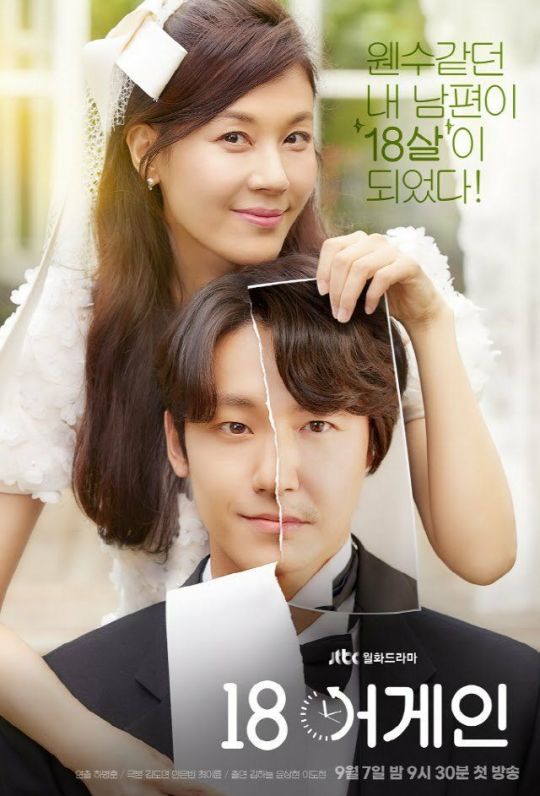
No. of episodes: 16
Personal Rating: 9.5/10
I personally had the busiest time of my life trying to juggle law school with other things and when I had a short break last week, I planned to watch a drama. I intentionally waited until 18 Again to be done airing and my decision was absolutely right because if I were to watch the drama on going I’d suffer from just waiting for each episode to be aired and will most probably be more attached to the drama than I do right now.
Before I lay down my reasons why this drama is so good that i gave it nine and a half point, I want to tell how I feel right now post-18 Again (this is surely a phase). So, I managed to finish watching the drama in 3-4 days and after I closed the window of the last episode, I felt content but empty at the same time. Contented because the ending was so good and satisfying but at the same time the emptiness kicked in when I realised that I can no longer see these beautiful characters anymore. After the last episode, every time I listen to the OSTs, saw any clips especially the heartfelt ones; I’d cry and that’s just how impactful 18 Again was.
Synopsis:
The drama (based on the movie 17 Again) was basically started Hong Dae Young (Yoon Sang Hyun) and Jung Da Jung (Kim Ha Neul) facing a marriage problem which lead to a decision to get a divorce, at least for Da Jung. They live seperately at the moment, Da Jang with their children and Dae Young with his best friend whom he had known since high school, Go Deok Jin (Kim Gang-Hyun). Despite being high school lovers and were very passionate to achieve their dreams, Da Jung and Dae Young were at the cross roads when Da Jung got pregnant at the age of 18. They then decided do put a halt to their dreams and got married, for their twins, Si Ah ( Roh Jeong Eui ) and Si Woo (Ryeo Un). This might started with a whole decision to be responsible adults but as time goes by they started having regrets given that life has been hitting them so hard. Eventually, after 18 years they come to a decision to get divorce - which Da Jung insists, and could not change her mind when Dae Young had no idea why they were fighting that it became this messy. This made Dae Young so frustrated that his life turned out this way. Then he made his way to his high school gym; which is now attended by his children, to shoot some balls into the basketball ring. Out of habit, he made a wish to be young again and yes, you guessed right. His wish came true! The lights went out and when it turned back on he was in the body of 18 year old Dae Young (Lee Do Hyun).
Okay so now let’s just dive into the 5 reasons why this drama is so worth watching.
1. The plot growth and character development
I love how the plot was arranged. The writers absolutely know what they want to express in each episode episode. I like how the drama projects certain scenes from one character’s point of view and then reveals another character’s side of the story. The whole drama really wants to say that what you see is not entirely what you know. This results in a story so beautifully written, revealing one by one the things no one knows about a character. Their struggles and pain they hide from people they love just so that they won't be burdened by them, which does not necessarily resulted positively since misunderstandings occur now and then.
The characters’ development is something that should also be noted. In the beginning we see how Dae Young was a father and husband who regrets his decision for having to sacrifice his dream for his family. But, after getting the chance to be young again and to be able to do what he want - that is basketball. He started to realise his mistakes and this has opened his eyes as to what his dream actually is. Being able to only help and care about his family without them knowing who he is, was so painful for him since they really have the idea of not needing him anymore in their life. Same goes for Da Jung, at first she felt like Dae Young was changing, did not love her anymore and was pathetic. However, as time goes by some things came to her knowledge, her perspectives towards Dae Young changed. Other characters have their own story and growth as well but you guys should find them out yourselves.


2. Lee Do Hyun
When I say Lee Do Hyun carried the whole drama, I’m not even exagerrating. he potrayed his character as a young father who struggles to raise children and provide for his family. I think he touched my heart the most. I saw his behind the scenes and I can totally see his passion and the amount of effort he puts into his acting. The chemistry he has with other actors are exceptional maybe because of his bright personality. I just realised I have watched everything in his discography and I must say his acting has grown so much, he discovers and shows new sides of as well - through this character.


3. Double Second Lead Syndrome
This drama did not only made me choose between the two main male leads for Da Jung but also between the two student who like Si Ah. Ye Ji Hoon ( Wi Ha Joon) was competent, kind, handsome and smart. He’s a famous baseball player, he is everything you want in a guy! but I can’t help myself to get swooned by Dae Young as well. It was hard for me. but, between Goo Ja Sung (Hwang In Yeop) and Seo Ji Ho (Golden Child’s Bo Min), I was team Jiho since day 1 because I just can bring myself to like Jasung. I mean he bullied Si Woo so... although he had his moments, and changed later in the drama. All im saying is its fun to have these 4 male characters who are totally different and I enjoyed rooting for them.
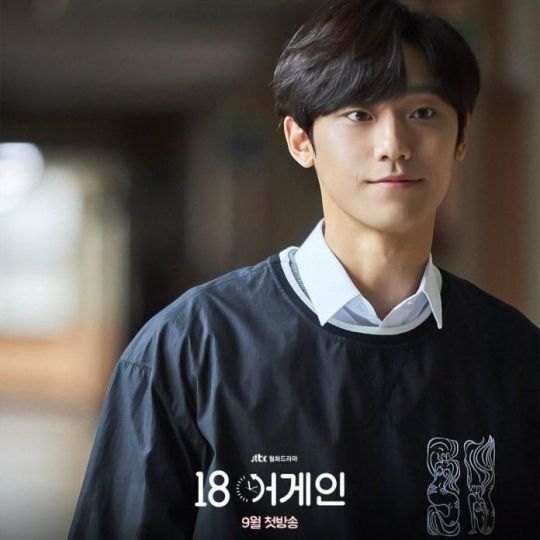


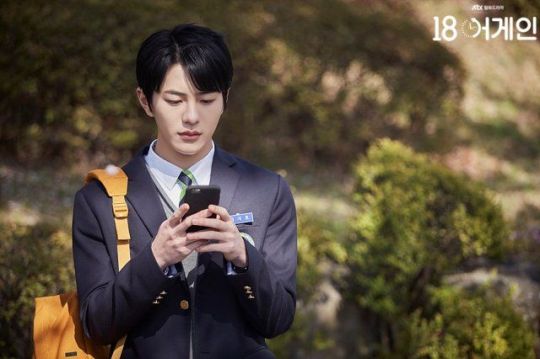
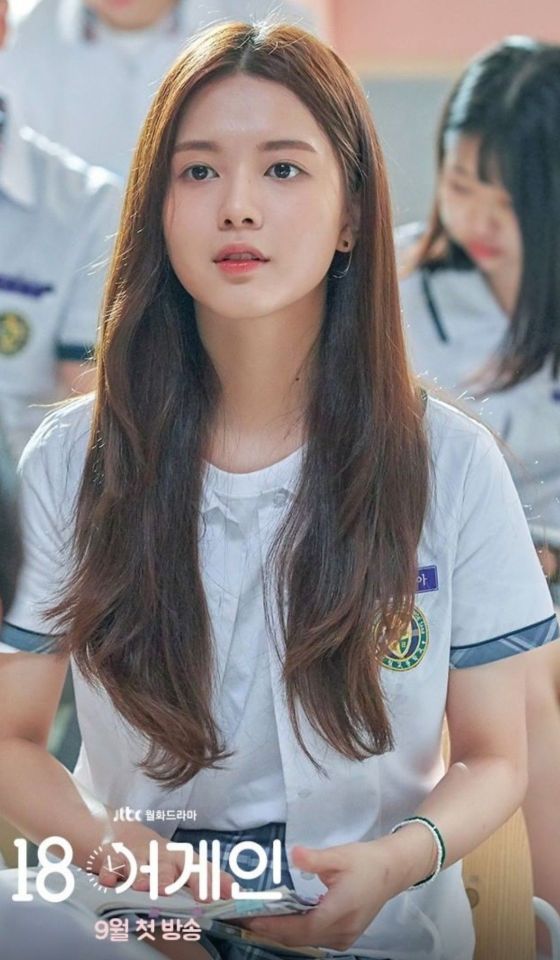
4. The Production
This drama has amazing production quality. I love the transitions between adult and young Dae Young scenes. Also, how they made a lot of swoon worthy scenes so beautiful. The OSTs are amazing as well. I still listen to them. I want to give an appreciation to this drama for letting me discover new talents, the younger casts. They’re so good at potraying their roles. I really enjoyed every scene relatingn to students at Serim High. The fact that they give us extra clip (variety show kinda) after filming and they’re still in their characters was fun to watch as well. This just makes it harder for me to detach from the drama.
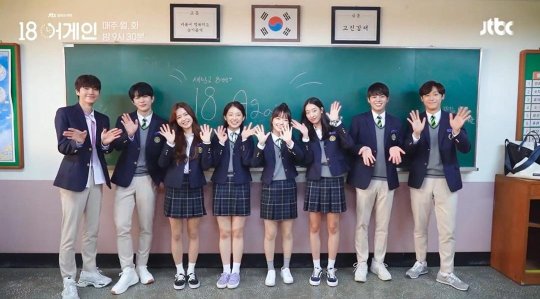
5. The Message
The writers for this drama really know what they’re doing. Every story, every role has its purpose. Each episode was totally necessary and I’d say has something to tell. This story is about second chances, sacrifices, passion and love. For me personally, I can no longer watch a drama solely for entertainment. I need something more to enjoy it. 18 Again gave me that. It made me rethink about how I treat my loved ones. Whether I appreciate them enough or if I ever consider their pain and sacrifices because you see, the world really does not revolves only around us. 18 Again also caters social issues like discrimination and sexual harrasment against women at workplace, school bullying, illegal college broker and many more. I also appreciate that they point out how children behaves differently to their parents and friends due to the expectations parents have on them. I think we all can relate to that.
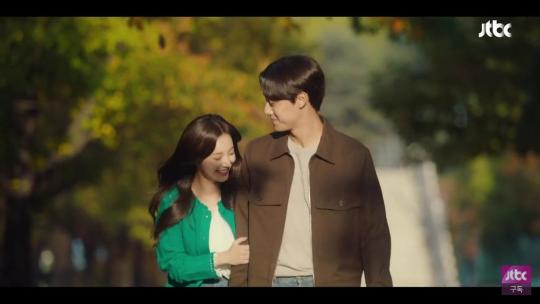
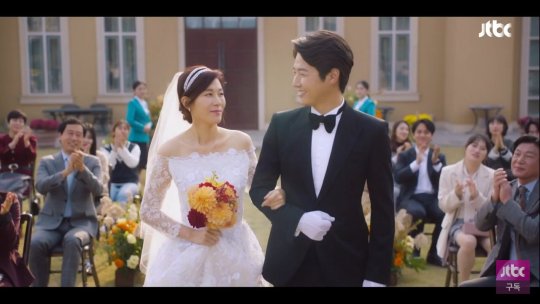


All in all, 18 Again is a beautiful story about family rather than just about an adult who gets to live his young life again. i think thats all. took me almost a week to write this but yea. Hope you guys enjoy it and happy binge watching! Don’t forget to tell me what you guys think about the drama💞
- shaininn⭐
31 notes
·
View notes
Text
23: november 21, 2018
// i know i bid goodbyes a thousand times, but this is the end of all the endings. i wanted to close our book the exact same day we began. my plot twist of 2018, my great love, i met you exactly 2 years ago today (nov 21, 2018). it was my favorite accident i ever had. naiintindihan ko na rin ang dahilan nang minsan mong pagpili sa akin, dahil madali lang din siguro akong iwan. i am your pit-stop, the place where you pause for, before going on your destination. the foster home, before you found your forever home. the girl, before “the one” arrives. two years ago, from today, i met a stranger around my orbit. i honestly don't know what to write on this page. i am just so grateful that our paths once crossed in the past. indeed, it’s a miracle that we once met. i am happy that you were the first stranger i met here. i am so glad because you replied that lonely night. i am just so blessed that i once met you. i remember that first night, this same night 2 years ago from today. we had our first argument. we were arguing about who's staying, we were arguing if we were gonna continue to talk the next day. honestly, there was this little teeny-tiny hope in me that i wanted you to stick around, 'cuz i wanted to know you more.
and you did.
at least, you stayed.
we were both hesitant if we were going continue. i was scared. i didn't know where it would lead us. i wanted to know you. that night, i was all curious about you. i wanted to know more about you. you know the feeling when you've only read the back cover of a good book and you don't ever want to let go from your hands? that's it. you were "that book." i am so thankful for the time we had, the demons we've met, the saddest nights we had, the good laughs we shared, the weirdest times, the tears we shared, the drunk nights we had, and the hardest fights we've fought. i am so thankful for that. i'm thankful for you were once my everything.
i know that i wasn't the perfect girlfriend that you deserve, but trust me, i gave my everything for what we had. and i have no regrets. or maybe i have. maybe some. there are some things i could’ve done. but it was too late. you’re gone, permanently. i admit that i had a lot of shortcomings and mistakes. i am aware that i wasn't enough. and i'm really sorry for that. i know that i've caused you pain too. i know i've wounded you. and i'm really sorry for that.
i'm sorry.
and i'm happy from where it brought us. it hurts me still that you are not a part of my life anymore. i hate that you’re now gone.
for good.
my greatest love, i want you to stay alive and i want you to be happy. wala akong ibang hiniling kundi ang maging masaya ka. i know i have expressed so much of gratitude, i just wanna say thank you for staying as long as you could - as long as you could ever give. thank you for staying beside me when i lost tatay 2 years ago (dec, 11 2018). include tatay in your prayers. you don't know how grateful i am for you - because you came. and that's a beautiful thing to think about: at least, you came. dumating ka. nanatili ka. at umalis ka nang may mga ngiting pagpapalaya sa 'yong mga mata. pero totoo, salamat sa pagyakap nung gabing iniwan na kami ni tatay.
you stayed.
and i've said a thousand times of apologies, but listen to this with all your heart. i'm sorry for begging you to stay, to love me again, and to fight for me - to fight for what we had, for what we've built. i'm sorry for begging for your existence to stay in my life. it was so selfish of me. nakalimutan kong kapag nagmamahal tayo, piliin natin silang maging masaya, kahit pa hindi na tayo ang piliin nila. it's just sad you know, we entered this year together, we entered this pandemic together, and now, there's no 'us' could be found. wala na, tapos na. i know you finally found someone better than me— or what we had, i am geuinely happy for you. i still don't know the basis of why you left. maybe bc you stopped seeing your future with me, or maybe she can stay up late with you and have a good conversation, maybe she's way better than me, or maybe i just wasn't good enough for you anymore. tinanggap at niyakap ko na lang ang mga sugat. mahirap, cuz this quarantine made me realize how much i love you— how much future i see that i can have with you. totoo, bago mo pa sabihing hindi na ako— bago mo pa 'ipinahinga' ang kwento nating dalawa. this quarantine got me like: god, this is the man i want to spend my lifetime with. kasi you were busy with your passion e, i was just there, admiring you— admiring what you do from a far. feeling ko sobrang mature natin maghandle ng kung anong meron tayo.
if i only have a clue that it would be the last time i'd saw your face - the last sunset we've witnessed, i'd walk slower, i'd hold your hand tighter, stare at ur face the whole damn day, hug you with all my power, i'd kiss the hell out of u, share the whole ocean with you and take you to a million sunsets. if only i knew, that i would never ever get to see you again, i'd do anything to stop the time. if only i knew, it was the last time, i would've made our last page the best. and that day, would be our forever. evergreen. pero bigla na lang tayong natapos. —
reach your dreams, be the greatest writer that you always wanted to be, reach those stars even without me. be the famous writer that i’ll watch from a far. promise me to write our story and change our ending. make it a happy ending we never had. i learned that sometimes, good byes and letting go is the realest form of love we could ever give. hang in there and be safe. it was a blessing to meet you. i’m letting you go, my greatest love. promise me that you'll be happy. you are already forgiven.
i still remember the first promise you gave, that you will never ever write anything about me. ‘cuz you said, i will not be one of those past girls who ruined you. and you’re still holding onto that promise. i honestly don’t know what to feel about not finding myself in any of your poetry. i have lost my hope finding myself between your broken lines.
i will never forget you— the first promise i gave this same night, 2 years ago.
trust me, i won’t.

“nakakapagod pero ipangako mo na ‘wag kang susuko, may tiwala ako sayo.”
— thought you needed to hear this line from a stranger too.
that simple line was exactly what i needed, 2 years ago. there was this glint in me, when you said that line. it wasn’t just your eyes that took me to places, it was your soul, mind, and heart, that makes me want to stick around with you. it was your hidden soul, your topsy-turvy thoughts, your ocean-mind, the realness of your heart, it was all of these, that intrigued me, that pulled me back to you— that made my love stronger and unfeigned. i told you, you are “that book.” thank you.
you are golden. :) //
kinda hate to admit this, but there would always be love that will live permanently with me. at least, that love— stayed.


last updated: november 3, 2020 ended: november 21, 2020 11:30 pm taken from our last sunset together.
#driedtears#hiddengrays#thoughts#personal#random#randomthoughts#2018#2020#thoughts and hugot#random thoughts#letter#sulat#my healing process
23 notes
·
View notes
Text
You Oughta “Get Carter”
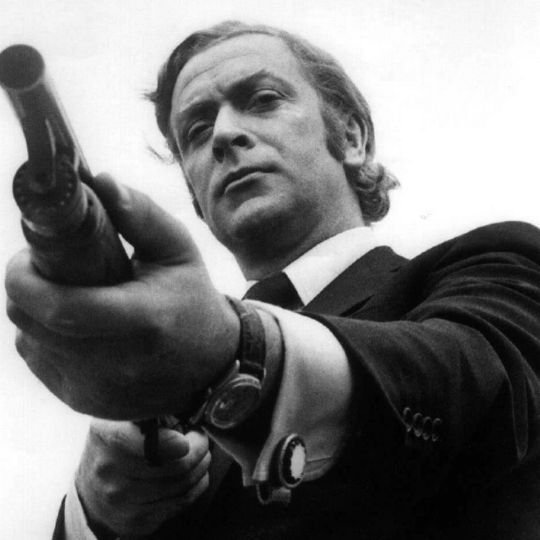
Another old Night Flight piece, tied to a Turner Classic Movies airing, about a movie I never tire of watching. (Unfortunately, the Krays film “Legend” turned out to be not so good.) ********** The English gangster movie has proven an enduring genre to this day. The 1971 picture that jumpstarted the long-lived cycle, Get Carter, Mike Hodges’ bracing, brutal tale of a mobster’s revenge, screens late Thursday on TCM as part of a day-long tribute to Michael Caine, who stars as the film’s titular anti-hero.
We won’t have to wait long for the next high-profile Brit-mob saga: October will see the premiere of Brian Helgeland’s Legend, a new feature starring Tom Hardy (Mad Max: Fury Road, The Dark Knight Rises, Locke) in a tour de force dual role as Ronnie and Reggie Kray, the legendarily murderous identical twin gangleaders who terrorized London in the ‘60s. The violent exploits of the Krays mesmerized Fleet Street’s journalists and the British populace until the brothers and most of the top members of their “firm” were arrested in 1968.
The siblings both died in prison after receiving life sentences. They’ve been the subjects of several English TV documentaries and a 1990 feature starring Martin and Gary Kemp of Spandau Ballet. However, the Krays and their seamy milieu may have had their greatest impact in fictional form, via the durable figure of Jack Carter, the creation of a shy, alcoholic graphic artist, animator, and fiction writer named Ted Lewis, the man now recognized by many as “the father of British noir.”
Born in 1940 in a Manchester suburb, Lewis was raised in the small town of Barton-upon-Humber in the dank English midlands. A sickly child, he became engrossed with art, the movies, and writing. The product of an English art school in nearby Hull, he wrote his first, unsuccessful novel, a semi-autobiographical piece of “kitchen sink” realism called All the Way Home and All the Night Through, in 1965.
He soon moved sideways into movie animation, serving as clean-up supervisor on George Dunning’s Beatles feature Yellow Submarine (1968). However, now married with a couple of children, he decided to return to writing with an eye to crafting a commercial hit, and in 1970 he published a startling, ultra-hardboiled novel titled Jack’s Return Home.
British fiction had never produced anything quite like the book’s protagonist Jack Carter. He is the enforcer for a pair of London gangsters, Gerald and Les Fletcher, who bear more than a passing resemblance to the Krays. At the outset of the book, recounted in the first person, Carter travels by train to an unnamed city in the British midlands (modeled after the city of Scunthorpe near Lewis’ hometown) to bury his brother Frank, who has died in an alleged drunk driving accident.
Carter instantly susses that his brother was murdered, and he sets about sorting out a hierarchy of low-end midlands criminals (all of whom he knew in his early days as a budding hoodlum) responsible for the crime, investigating the act with a gun in his hand and a heart filled with hate. He’s no Sam Spade or Phillip Marlowe bound by a moral code – in fact, he once bedded Frank’s wife, and is now sleeping with his boss Gerald’s spouse. He’s a sociopathic career criminal and professional killer – a “villain,” in the English term -- who will use any means at his disposal to secure his revenge.
Carter’s pursuit of rough justice for his brother, and for a despoiled niece, attracts the attention of the Fletchers, whose business relationships with the Northern mob are being disrupted by their lieutenant’s campaign of vengeance. As Carter leaves behind a trail of corpses and homes in on the last of his quarry, the hunter has become the hunted, and Jack’s Return Home climaxes with scenes of bloodletting worthy of a Jacobean tragedy, or of Grand Guignol.
Before its publication, Lewis’ grimy, violent book attracted the attention of Michael Klinger, who had produced Roman Polanski’s stunning ‘60s features Repulsion and Cul-de-Sac. Klinger acquired film rights to the novel before its publication in 1970, and sent a galley copy to Mike Hodges, then a U.K. TV director with no feature credits.
Hodges, who immediately signed on as director and screenwriter of Klinger’s feature – which was retitled Get Carter -- was not only drawn to the taut, fierce action, but also by the opportunity to peel away the veneer of propriety that still lingered in British society and culture. As he noted in his 2000 commentary for the U.S. DVD release of the film, “You cannot deny that [in England], like anywhere else, corruption is endemic.”
Casting was key to the potential box office prospects of the feature, and Klinger and Hodges’ masterstroke was securing Michael Caine to play Jack Carter. By 1970, Caine had become an international star, portraying spy novelist Len Deighton’s agent Harry Palmer in three pictures and garnering raves as the eponymous philanderer in Alfie.
Caine had himself known some hard cases in his London neighborhood; in his own DVD commentary, he says that his dead-eyed, terrifyingly reserved Carter was “an amalgam of people I grew up with – I’d known them all my life.” Hodges notes of Caine’s Carter, “There’s a ruthlessness about him, and I would have been foolish not to use it to the advantage of the film.”
Playing what he knew, Caine gave the performance of a lifetime – a study in steely cool, punctuated by sudden outbursts of unfettered fury. The actor summarizes his character on the DVD: “Here was a dastardly man coming as the savior of a lady’s honor. It’s the knight saving the damsel in distress, except this knight is not a very noble or gallant one. It’s the villain as hero.”
The supporting players were cast with equal skill. Ian Hendry, who was originally considered for the role of Carter, ultimately portrayed the hit man’s principal nemesis and target Eric Paice. Caine and Hendry’s first faceoff in the film, an economical conversation at a local racetrack, seethes with unfeigned tension and unease – Caine was wary of Hendry, whose deep alcoholism made the production a difficult one, while Hendry was jealous of the leading man’s greater success.
For Northern mob kingpin Cyril Kinnear, Hodges recruited John Osborne, then best known in Great Britain as the writer of the hugely successfully 1956 play Look Back in Anger, Laurence Olivier’s screen and stage triumph The Entertainer, and Tony Richardson’s period comedy Tom Jones, for which he won an Oscar for best adapted screenplay. Osborne, a skilled actor before he found fame as a writer, brings subdued, purring menace to the part.
Though her part was far smaller than those of such other supporting actresses as Geraldine Moffat, Rosemarie Dunham, and Dorothy White, Brit sex bomb Britt Ekland received third billing as Anna, Gerald Fletcher’s wife and Carter’s mistress. Her marquee prominence is somewhat justified by an eye-popping sequence in which she engages in a few minutes of steamy phone sex with Caine.
Some small roles were populated by real British villains. George Sewell, who plays the Fletchers’ minion Con McCarty, was a familiar of the Krays’ older brother Charlie, and introduced the elder mobster to Carry On comedy series actress Barbara Windsor, who subsequently married another member of the Kray firm. John Bindon, who appears briefly as the younger Fletcher sibling, was a hood and racketeer who later stood trial for murder; a notorious womanizer, he romanced Princess Margaret, whose clandestine relationship with Bindon later became a key plot turn in the 2008 Jason Strathan gangster vehicle The Bank Job.
Verisimilitude was everything for Hodges, who shot nearly all of the film on grimly realistic locations in Newcastle, the down-at-the-heel coal-mining town on England’s northeastern coast. The director vibrantly employs interiors of the city’s seedy pubs, rooming houses, nightclubs and betting parlors. In one inspired bit of local color, he uses an appearance by a local girl’s marching band, the Pelaw Hussars, to drolly enliven a scene in which a nude, shotgun-toting Carter backs down the Fletchers’ gunmen.
The film’s relentless action was perfectly framed by director of photography Wolfgang Suchitzky, whose experience as a cameraman for documentarian Paul Rotha is put to excellent use. Some sequences are masterfully shot with available light; the movie’s most brutal murder plays out at night by a car’s headlights. The breathtakingly staged final showdown between Carter and Paice is shot under lowering skies against the grey backdrop of a North Sea coal slag dump.
Tough, uncompromising, and utterly unprecedented in English cinema, Get Carter was a hit in the U.K. It fared poorly in the U.S., where its distributor Metro-Goldwyn-Mayer dumped it on the market as the lower half of a double bill with the Frank Sinatra Western spoof Dirty Dingus Magee. In his DVD commentary, Caine notes that it was only after Ted Turner acquired MGM’s catalog and broadcast the film on his cable networks that the movie developed a cult audience in the States.
Get Carter has received two American remakes. The first, George Armitage’s oft-risible 1972 blaxploitation adaptation Hit Man, starred Bernie Casey as Carter’s African-American counterpart Tyrone Tackett. It is notable for a spectacularly undraped appearance by Pam Grier, whose character meets a hilarious demise that is somewhat spoiled by the picture’s amusing trailer. (Casey and Keenan Ivory Wayans later lampooned the film in the 1988 blaxploitation parody I’m Gonna Git You Sucka.)
Hodges’ film was drearily Americanized and relocated to Seattle in Stephen Kay’s like-titled 2000 Sylvester Stallone vehicle. It’s a sluggish, misbegotten venture, about which the less that is said the better. Michael Caine’s presence in the cast as villain Cliff Brumby (played in the original by Brian Mosley) only serves to remind viewers that they are watching a vastly inferior rendering of a classic.
Ted Lewis wrote seven more novels after Jack’s Return Home, and returned to Jack Carter for two prequels. The first of them, Jack Carter’s Law (1970), an almost equally intense installment in which Carter ferrets out a “grass” – an informer – in the Fletchers’ organization, is a deep passage through the London underworld of the ‘60s, full of warring gangsters and venal, dishonest coppers.
The final episode in the trilogy, Jack Carter and the Mafia Pigeon (1977), was a sad swan song for British noir’s most memorable bad man. In it, Carter travels to the Mediterranean island of Majorca on a Fletchers-funded “holiday,” only to discover that he has actually been dispatched to guard a jittery American mobster hiding out at the gang’s villa. It’s a flabby, obvious, and needlessly discursive book; Lewis’ exhaustion is apparent in his desperate re-use of a plot point central to the action of the first Carter novel.
Curiously, the locale and setup of Mafia Pigeon appear to be derived from Pulp, the 1975 film that reunited director Hodges and actor Caine. In it, the actor plays a writer of sleazy paperback thrillers who travels to the Mediterranean isle of Malta to pen the memoirs of Preston Gilbert (Mickey Rooney), a Hollywood actor with gangland connections. Hilarity and mayhem ensue.
All of Lewis’ characters consume enough alcohol to put down an elephant, and Lewis himself succumbed to alcoholism in 1982, at the age of 42. Virtually unemployable, he had moved back home to Barton-upon-Humber, where lived with his parents.
He went out with a bang, however: In 1980, he published his final and finest book, the truly explosive mob thriller GBH (the British abbreviation for “grievous bodily harm”). The novel focuses on the last days of vice lord George Fowler, a sadist in the grand Krays manner, whose empire is being toppled by internal treachery. Using a unique time-shifting structure that darts back and forth between “the smoke” (London) and “the sea” (Fowler’s oceanside hideout), it reaches a finale of infernal, hallucinatory intensity.
After Lewis’ death, his work fell into obscurity, and his novels were unavailable in America for decades. Happily, Soho Press reissued the Carter trilogy in paperback in 2014 and republished GBH in hardback earlier this year. Now U.S. readers have the opportunity to read the books that influenced an entire school of English noir writers, including such Lewis disciples and venerators as Derek Raymond, David Peace, and Jake Arnott.
Echoes of GBH can be heard in The Long Good Friday, another esteemed English gangster film starring Bob Hoskins as the arrogant and impetuous chief of a collapsing London firm. Released the same year as Lewis’ last novel, the John Mackenzie-directed feature is only one of a succession of outstanding movies – The Limey, The Hit, Layer Cake, Sexy Beast, and Lock, Stock and Two Smoking Barrels among them – that owe a debt to Get Carter, the daddy of them all.
5 notes
·
View notes
Text
"Is there a symbol?"
"Sir?" said Harriet.
"What symbol has this writer chosen to represent him- or her-self?"
"An insect."
"An insect??"
"It's a butterfly," said Annabel faintly, but Mr. Dial didn't hear.
"What kind of insect?" he demanded of Harriet.
"I'm not sure, but it looks like it's got a stinger."
Hely craned over to see. "Gross," he cried, in apparently unfeigned horror, "what is that?"
"Pass it up here," said Mr. Dial sharply.
"Who would draw something like that?" Hely said, looking around the room in alarm.
"It's a butterfly," said Annabel, more audibly this time.
- Donna Tartt, The Little Friend
1 note
·
View note